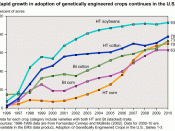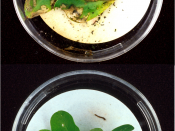GM Foods
Over the past decade genetically modified foods or GM crops as many people may call them, have became a big issue surrounding our food. There are many arguments on the pros and cons of the genetically modified food debate and no one seems to becoming up with a solution that could suite everyone. The two main issues these topics bring up are the arguments about the benefits and the risks. The benefits are herbicide tolerant crops that encourage less tilling, less soil erosion, and better crop production, and the possible risks are the possibility of creating new or more disastrous pests and pathogens that can out way the benefits of genetically modified foods.
Biotechnology is what started our fascination about genetically modified foods and the possibilities it could bring us. You might be asking yourself what is plant biotechnology? Plant biotechnology is the process of transferring isolated genetic material of organisms to specific plants so that the plants can carry and reproduce a desired genetic trait that farmers or consumers might desire.
These plants often have been produced by techniques in which "foreign" genes are inserted into the microorganisms, plants, or animals. Foreign genes are genes taken from sources other than the organism's natural parents. So basically GM plants contain genes that they would not normally have contained if researchers never had messed with the plants. This biotechnology became part of the food we eat because they want bigger and better crops so they use this method to genetically modify our food for a so called better outcome. The best argument for genetically engineered crops is the opportunity they present to help people with scarce food supplies, especially in the developing countries. Some of these crops are genetically modified to resist drought which can help increase crop productivity...


